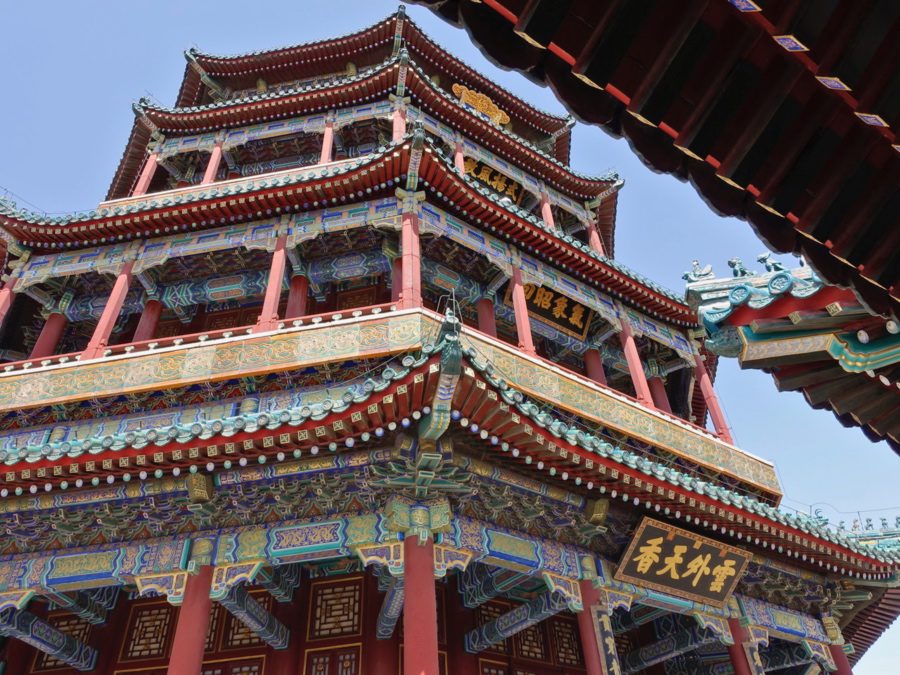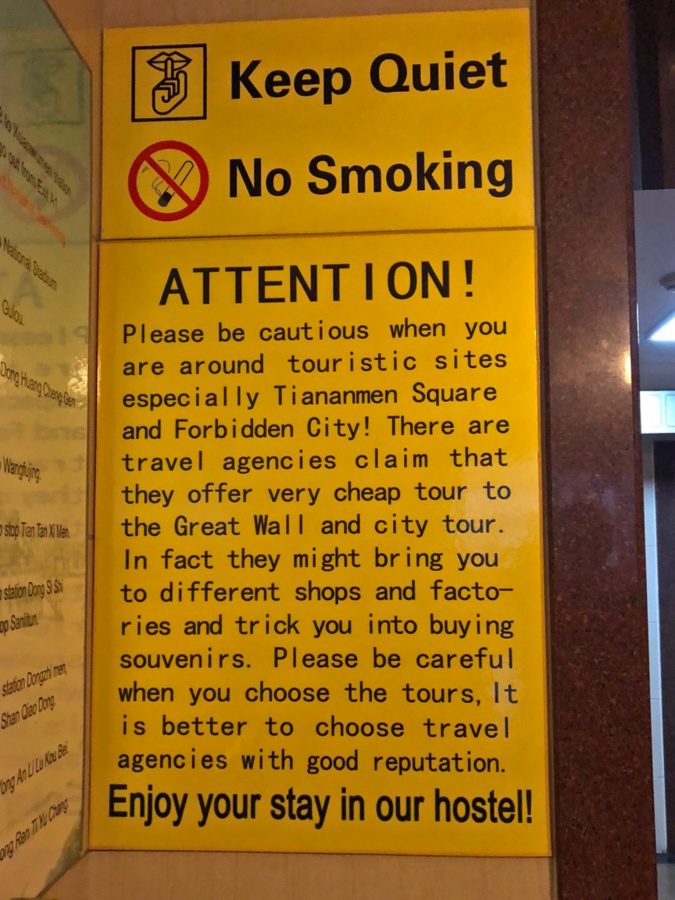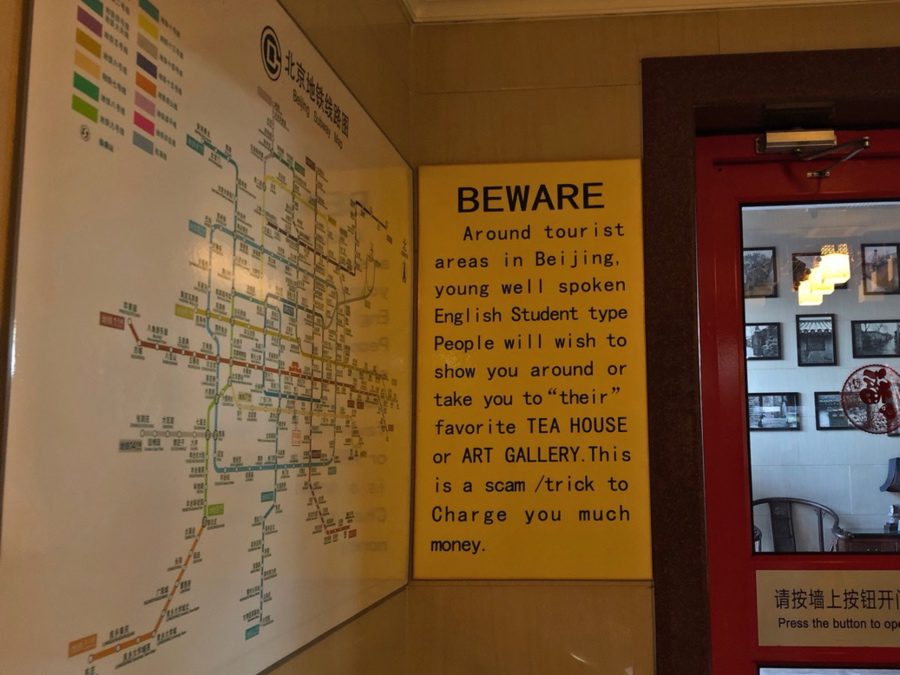That terrible feeling of getting scammed or ripped off when visiting a new country is infuriating.
It happens in all the major tourist hubs all over the world, and travelling in China is no different.
We may earn affiliate commissions from websites we link to, at no cost to you. Click here for details.

Knowing the most common tourist scams in China before you arrive, you’ll have a much better experience in this country.
Although the Chinese are hardworking, honest people, it’s expected that in the country with the world’s largest population, there are sure to be a few con artists.
Table of Contents
Scammers will target foreigners who may not be aware of potential scams to trick you out of your money or possessions.
They often target gullible-looking tourists or intoxicated individuals, so please read on to make sure you are not the target of any scams in China.
The scammers (who will speak good English) will generally target tourists for a few reasons;
Foreign tourists usually carry more cash and they’re often open to engaging in conversation with a stranger.
The con artist recognises that western tourists are more inclined to be polite to a stranger rather than appearing rude and walking away, so they play up to this.
Some of the following scams can be quite sophisticated and continue to catch even the most experienced travellers, but knowledge is power!
When planning your travels to any new destination, it’s important to be aware of your surroundings. Be educated before you arrive and use your common sense.
Once you know the scams to be aware of, don’t let this dissuade you to travel to China. There are many incredible sights to see and lots of delicious food to be devoured here.
This one happens in many Asian countries, not just in China. The con is that your taxi driver will tell you that your hotel has recently closed, or even burned down. He then recommends a new hotel, for which he will likely get a commission for each new guest he brings to that hotel.
How to avoid it
Take accredited taxis only. These can generally be found at official stands at airports. You’ll find that all registered taxis in Beijing have a “B” on their number plate. These taxi drivers won’t appear desperate for your business.
If you do get a scamming taxi driver, insist that you go to the address as planned. The driver will accept that you’re aware of what he’s trying to do and then drive you to the address as initially requested.
If he doesn’t, then simply get out of the taxi, along with your luggage, and try another taxi.
I recommend that you make hotel bookings using Booking.com, as the confirmation is emailed to you with a translation of the address in the local language. This can especially be helpful for countries such as China, where little English is spoken.
You can show the address written in Chinese to your driver. It will make your life much easier.
TIP: We prefer to travel in taxis with our backpacks/luggage in the backseat with us, rather than in the trunk of the taxi. This way, you can make a swift exit from awkward situations with your stuff if things don’t go to plan.
The fake taxis have many ways they will try to scam anyone, including locals.
TIP: Never show your money or wallet to the driver. They rely on the fact that you’ve just arrived in a new country and may not be so familiar with the currency just yet, and you’re probably tired from a long flight.
Always think ahead and have some small currency or notes in your pocket to pay the fare. It’s always a good idea to have an idea of how much an approximate fare is in Chinese Yuan from the airport to your hotel before you arrive.
We use Xe.com to check up-to-date exchange rates on our phones quickly. Download the app on your phone and add that currency conversion to your app before you arrive in a new country.
How to avoid it:
Be wary of insistent drivers trying to direct you to their taxi. Take accredited taxis at the designated taxi spots, and have an idea of your route beforehand. (Always have the address written in Chinese, as it’s very likely that your driver will not speak or understand English).
We recommend making your hotel reservations with Booking.com, as the app will translate the hotel into the local language.
Some airports have employees designated to help you find a taxi; the price will be decided beforehand, and you will receive a receipt before getting into the cab.
TIP: Another fantastic phone app we use to navigate our way around the world is Maps. Me.
Download it to your phone and also download the map of China before your arrival. This map can then be used offline. It’s a very useful tool.
RELATED POST – The Best Travel Websites to Save you Money

One of the highly popular scams in China, this one is particularly rampant in the touristy parts of Beijing (like Houhai Lake nightlife district and Wangfujing shopping district). Solo male tourists are the common target.
A Chinese person, more often than not a sweet, innocent-looking girl or a young student couple approach you. A common question would be “Where are you from”?
It doesn’t matter what country you say; she will mention that she has a friend/family member there or mention some well-known fact about your country. After building a rapport with you, chatting and laughing, they will suggest going somewhere to practice English, such as a teahouse, karaoke, or similar.
Thrilled by the chance to have an authentic Chinese encounter with a local, you eagerly accept. You follow them somewhere to sample some tea or whatever. Later, you’re presented with a ridiculously pricey bill (often several hundred dollars).
By this time, your new friend will have already disappeared after earlier excusing themselves to use the bathroom, not forgetting to collect their commission on the way out.
Now you’re outraged that you’ve been handed this bill. If you try to leave, you’ll find yourself with several large men who will demand you pay this bill before you leave. There aren’t too many options you have at this stage.
I’d suggest paying the bill and noting this one down as a lesson learned.
How to Avoid Getting into this situation:
Be somewhat wary if approached by a stranger, especially someone who speaks good English, as most Chinese tend to keep their distance from foreigners.
Next, if they want to take you somewhere to practice English, this should ring alarm bells for you. Kindly decline and be on your way.

This scam is common all over the world. These fake monks approach you and take out a donation book. The book lists fake donations made by people around the world, listed in many different languages.
A smart scam because this book adds a feeling of guilt for you.
How to avoid it:
Real monks rarely ever ask for donations in overcrowded tourist areas, so smile, firmly refuse and walk away.
Get Connected with eSIM

Get connected easily on your travels—buy an eSIM! An eSIM works like an app: buy it, download it, and get connected in minutes! It’s easy, affordable, and convenient. Keep your original phone number, too!
Click below and view which eSIM data plan you need for your next adventure. Use our referral code: RACHEL5045, to get $3 off your first purchase!
These guys like to take foreign tourists ‘for a ride to see the main highlights ‘. Some drivers will agree on one price with you (e.g. Y40), then later will claim that you misunderstood and will demand a much higher fare (e.g. Y400).
They may even try to claim that it’s Y40 per person, not the final price. This smiling driver will quickly get outraged and loud to intimidate you into paying. Don’t expect anyone to come to help you out, as locals will choose not to get involved.
How to avoid this:
Be on guard and avoid drivers who are insistently pursuing you to take a ride. If you do accept, agree to a price in writing. I type the numbers on my phone and ask the driver to agree first, just so there are no surprises.
If you find yourself in the position, leave the agreed initially upon fare on the seat and calmly walk away.
These super cheap, low-quality tours are found around popular markets and busy streets.
The cheap ‘highlights of Beijing’ tour you’ve just booked will not be enjoyable. You will be carted around to shops to buy overpriced items and souvenirs, along with other tourists. An inexperienced guide leading the way receives a commission from each store he takes you to on the tour.
How to avoid it:
Be smart, plan ahead, and use your common sense. Plan your days by searching online for information on the best tours and attractions and only used licensed operators.
Ask for the assistance of recommendation from your accommodation provider, too. This scam is usually easy to spot.
So if it sounds too good to be true, it probably is.
TIP: If you’re exploring Beijing – I highly recommend joining this Beijing By Bike Tour.
You may or may not experience some of these scams during your visit to China. Just remember that all of these scams can be avoided if you educate yourself. If you’ve read this entire post, you should be ready.
Remember to use your common sense and be aware of what’s happening around you. If you do this, you’ll have a wonderful experience.
You may also enjoy reading about 10 of the most bizarre foods in China. If you have the time, I recommend you take the train and visit the ancient city of Pingyao. We enjoyed our trip here, especially exploring the Old City.
And, check out our recommendations on what to eat in Pingyao while you’re there.
Are you looking for a new adventure? We loved our Overland Trip from Lhasa to Kathmandu.
If you’re looking for more of our latest Travel Hacks, tips on how to save money for travel or even our suggestions for 20 Jobs that PAY YOU to Travel the World, our travel blog has it.
Start at our Travel Resources Page for ALL our favourite travel gear, products, and travel websites we love.
✈️ Flights: We use Skyscanner to book cheap flights worldwide.
🏨 Accommodation: Booking.com is our preferred platform for booking hotels and accommodation.
🏥 Travel Insurance: We recommend Heymondo (Get 5% off Heymondo) & SafetyWing
🚌 Transportation: Trainline is the best website to reserve trains. We use Omio to book transport worldwide. For travel in Asia, we use 12Go.
🚘 Car Rental: We use DiscoverCars to book rental cars worldwide.
👫 Group Tours: G Adventures OR compare multi-day tours worldwide with Tourradar.
📸 Day Tours & Trips: GetYourGuide & Viator are the only two platforms you need.
📚 Lonely Planet: The Best Range of Travel Guides & Ebooks, and FREE Shipping! (use code RACHELDAVEY10 for a 10% discount)
🎒 Luggage: Osprey Farpoint 40L Backpack or Samsonite Luggage Range.
🛄 What to Pack: Don’t forget your Universal charger and a good power bank. To help you pack the essentials, here is our ULTIMATE Packing List for all Travellers.
🐶 Become a House Sitter: Join Trusted Housesitters and enjoy FREE accommodation worldwide. Use our invite to receive 25% off your new membership.
💰 Send Money Anywhere: WISE & Revolut are the best online accounts that let you send money, get paid, and spend money internationally. Both are so easy to use and way cheaper than any bank transfer.
📶 Stay Connected: Airalo eSIM allows you to get connected the moment you land at your destination, and you can avoid those expensive data roaming charges. We LOVE this product! Use promo code NOMAD15 for 15% off ALL eSIMs (new Airalo users only) OR use NOMAD10 for 10% off ALL eSIMs (for existing Airalo users)
✅ Check out our Travel Gear and Travel Resources for more valuable tips to save you money!